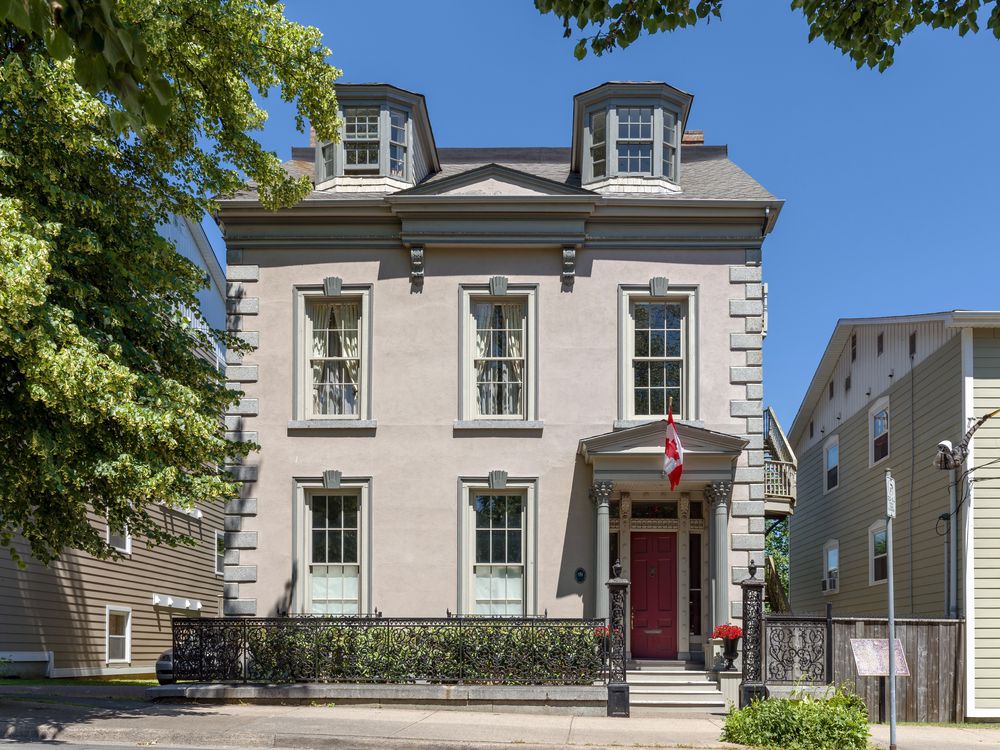The meticulously restored Halifax mansion of a Father of Confederation has been put up for sale, for less than the price of a typical semi-detached house in Toronto.

Jonathan McCully, a journalist, politician and lawyer, helped plot the creation of the new nation of Canada from the stone residence, which is now being offered for $785,000.
“You can imagine the conversations and the writing that went on in that house, with him writing the prose of Confederation against the people who were writing against Confederation,” said Halifax historian Blair Beed.
The house has another claim to fame: It once housed the offices of Salter Street Films, the now-defunct television and film production company behind, among other things, the sexy international sci-fi TV series “Lexx.”
READ: $10 M mansion: Gold-mining CEO lists Halifax waterfront home
The three-storey Brunswick Street house, built in the 1850s, is 3,667 square feet.
At the time it was built, that stretch of Brunswick Street was an upscale neighbourhood.
Real estate agent Carolyn Davis Stewart said the property offers a unique glimpse into upper-class life of the era, with its traditional mantles and ornately carved mouldings.
“The mouldings have a lot of circular little motions which would have been very tedious to do, and that’s an art that’s certainly been lost, for the most part,” she said. “To do anything so intricate and delicate today would be really quite amazing.”
The four-bedroom home has an updated kitchen and four bathrooms, views of Halifax harbour and parking for up to six cars.
Through his writing and law career, McCully was a fierce advocate for Confederation and spent his post-Confederation life as a senator and judge, according to Beed.
“In Nova Scotia there was a big anti-Confederation movement that wanted us not to be part of a union,” said Beed. “He would be writing in favour for Confederation and, with a legal background, be able to say how it would work.”

Get breaking National news
Beed said McCully conducted much of his work from the Brunswick Street house.
The house’s future was once uncertain, said Beed. Although it was designated a historic site in the 1970s, he said the provincial government “did a lousy job” at preserving the mansion.
READ: Inexpensive NS mansion that captivated internet is sold – over asking
Beed said he was shocked when he visited the house in the 1980s.
“Water was dripping down the ceilings, but you could see it was a beautiful, beautiful house: the architecture inside, the mouldings and everything were still there,” he said.
“It was just on the verge of being a ruin.”
It was almost too far gone when Paul Donovan and his brother Michael swooped in in the early 1990s and acquired the house to use as office space for their Salter Street Films.
“That house was derelict, it had been derelict for a long time … it was crumbling,” said Paul Donovan. “But it was really pretty, it had very good bones.”
He bought the house from the city for $2, but he estimates they spent about $500,000 on renovations.
Donovan, who still works as a television and film writer, spent “a long time” restoring the house to its former glory and said it provided a stimulating environment for their creative pursuits.
“I have this view, personally, that offices are a lot like prisons,” he said. “I don’t see why they can’t be more like a home.”
WATCH: Legacies of Confederation examines Canada’s birth

Donovan said he was not drawn to the house because of its connections to Confederation. In fact, he doesn’t like McCully or Confederation very much.
Nova Scotia’s entry into Canada brought an end to natural free trade and harmed its economy, Donovan said.
“I’ve always thought Confederation was a bad idea, though it’s a little late to undo it,” he said. “But I think he was a bastard to have done that against the will of Nova Scotia.”
He referred to McCully as a “bad spirit” within the house.
After the film company went out of business, the house was sold to Jason Ross, the current owner, who holds similar views regarding McCully.
Ross said he believes Edgar Billings Jr., the man who built the house, should get all the credit for its beauty and that McCully bought the house “opportunistically” for below market value.
While much of the restoration legwork was done by the Donovans, Ross said he did much of his own renovations himself.
Rather than hiring contractors, Ross said he enlisted the help of his neighbours and provided jobs to young people in the area, effectively creating a community project.
As much time and effort as he put into converting the studio into a home, Ross believes it’s time to move on after more than a decade of living there.
“I just got a spot in the country and I just don’t find myself spending that much time here,” he said. “It’s actually quite a livable house, but it’s just me and my dog right now.”
Ross said he would like to see the future owners use the house to in some way benefit the community, which no longer has the same reputation for affluence as it did in McCully’s age.
“That would be an absolutely delightful outcome,” he said.







Comments
Want to discuss? Please read our Commenting Policy first.